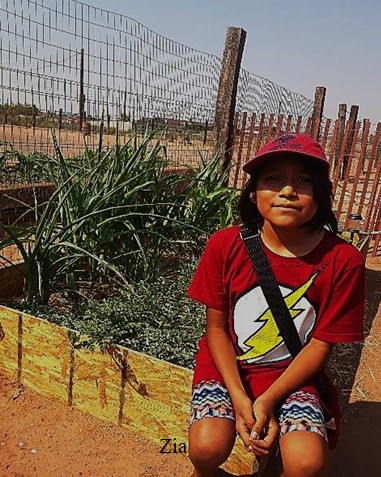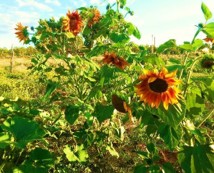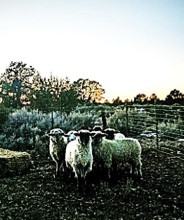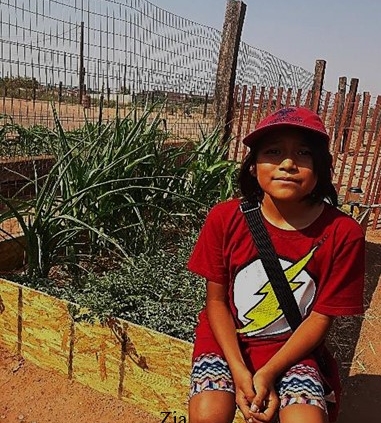Flipping Food Insecurity, One Grower at a Time
Flipping Food Insecurity, One Grower at a Time
By James Skeet
To begin our discussion, we do not like the phrase“ food insecurity” pegged to a specific group of people. We are all dealing with “food trauma”: food that is neither medicinal nor beneficial to our wellbeing. Food that has been commoditized and subsidized by the federal government has done major damage to us all, and especially to indigenous people.
 The introduction of food rations is correlated with ill heath in all indigenous communities. Large quantities of low-grade foods have dismantled the self- sufficient nature of the people and detached them from the local, indigenous foods. Despite the harsh, arid environment of the Southwest, local food provides more nutrients than food-like substances spawned by modern factories. Indigenous people have done their best to adapt to these modern foods and have treated with great respect whatever food they have received. But ultimately they have lost access to nutrient- dense food. Thus, it is not so much “food insecurity” as it is “food trauma”.
The introduction of food rations is correlated with ill heath in all indigenous communities. Large quantities of low-grade foods have dismantled the self- sufficient nature of the people and detached them from the local, indigenous foods. Despite the harsh, arid environment of the Southwest, local food provides more nutrients than food-like substances spawned by modern factories. Indigenous people have done their best to adapt to these modern foods and have treated with great respect whatever food they have received. But ultimately they have lost access to nutrient- dense food. Thus, it is not so much “food insecurity” as it is “food trauma”.
Let us share a story about a native grower, brave and fierce in the face of food trauma and climate instability. We met this young Navajo girl, Zia, in August while visiting gardeners in a Navajo Nation Housing neighborhood, growing their first crops. In the middle of this wind-blown and sand-filled neighborhood, we spotted two green parcels of veggies. Full of tomatoes, corn, squashes, melons, and pumpkins, the gardens looked so beautiful, and yet, so out-of-place. As we exited our car, we were greeted by Zia, who had inspired not only her parents, but also her next-door neighbors, to build small gardens in their backyards.
Earlier that spring, Zia had started several seedlings and then needed a place to plant them. Lucille Krause and Herbert Zahne worked with Zia’s family to start the garden, using materials supplied by our organization.
The majority of the food sold in grocery stores is produced using conventional farming techniques, both throughout the United States and abroad. These farms rely heavily upon glyphosate (the chemical in RoundUp used to control weeds) and petroleum-based fertilizers. These chemicals, coupled with overgrazing and intensive plowing, have destroyed the soil’s micro ecosystems and leached minerals from the soil.
Zia stood proudly before her raised bed, so determined to continue nurturing the plants that now had roots growing down into the earth and leaves spreading outward and upward.
After boldly asking us,“Now what do I do?” we walked with her throughout her garden, answering questions, showing some garden tricks, and speaking about the small, unseen bugs beneath her feet. She was an eager sponge, soaking up information and preparing to put her new skills into practice. Before we left, we asked what plants she wants to grow next. She quickly responded with “carrots and broccoli,” some of her favorites. We hinted that because she was growing her own garden, her veggies would taste sweeter than those found in stores. In an era of limited access to nutrient-rich foods, Covenant Pathways is encouraging native families and challenging systems to make changes in the way we eat and live.
The majority of the food sold in grocery stores is produced using conventional farming techniques, both throughout the United States and abroad. These farms rely heavily upon glyphosate (the chemical in RoundUp used to control weeds) and petroleum-based fertilizers. These chemicals, coupled with overgrazing and intensive plowing, have destroyed the soil’s micro ecosystems and leached minerals from the soil. The result negatively impacts the environment, our individual biological function, and the health of our communities. Without access to nutrient-dense food, our own bodies slowly die from the inside out. Without the microbes and the minerals in the soil, our bodies can’t get the essential amino acids needed to fight viruses and cancers. Much like Zia’s garden, any garden without synthetic inputs will produce sweeter-tasting foods with much higher nutrient levels.
The good news is that regenerative farming practices are changing the way foods are being produced. Regenerative farming has its roots in indigenous farming, which we refer to as Indigenous Regenerative Intelligence. Regenerative farming does NOT apply any chemicals or petroleum-based fertilizers. It does NOT plow. Instead, it focuses on nature’s natural processes. In other words, regenerative farming imitates nature’s patterns. Contrast this with conventional farming, a cultural mainstay started in the 1950s, that has become a mindset with massive, expensive fertilizer inputs.
 The challenge in accessing healthy foods, rich in nutrients, in Native and other low-income communities is price and availability. New Mexico organic markets and companies, with whom we have spoken, do not want to cater to the low-end, rural indigenous communities because of the effects on their bottom line. The markets and companies monopolize the natural markets, catering to high-end buyers in urban areas. In our native communities, few families could afford the higher- quality, higher-priced foods, even if the grocery stores did have these foods available for purchase. So commodity and grocery-grid foods, driven by production that numbs our taste buds and harms our health, continue to hit our indigenous tables, to be consumed by native people lacking alternative solutions. Furthermore, indigenous people are subjected to distribution disruptions, increasing the probability of hunger and scarcity, as we progress through repeated waves of the pandemic.
The challenge in accessing healthy foods, rich in nutrients, in Native and other low-income communities is price and availability. New Mexico organic markets and companies, with whom we have spoken, do not want to cater to the low-end, rural indigenous communities because of the effects on their bottom line. The markets and companies monopolize the natural markets, catering to high-end buyers in urban areas. In our native communities, few families could afford the higher- quality, higher-priced foods, even if the grocery stores did have these foods available for purchase. So commodity and grocery-grid foods, driven by production that numbs our taste buds and harms our health, continue to hit our indigenous tables, to be consumed by native people lacking alternative solutions. Furthermore, indigenous people are subjected to distribution disruptions, increasing the probability of hunger and scarcity, as we progress through repeated waves of the pandemic.
COVID so swiftly exposed the vulnerability of low socio- economic families across the United States. With the lack of healthy foods in these communities, chronic diseases run rampant as low-nutrient foods make it difficult for our bodies to fight the virus.
The food edge is near. We cannot sustain the food system the way we have in the past. We must look towards a transformative system that reestablishes local food markets with a regenerative, local economy. We have no other option than to grow our own food.
 Locally grown food provides better access to better quality food. The average, grocery-store consumer ultimately pays for good-looking food that transports well, but lacks in quality, taste, and nutrition. The push to assist native families to grow their own foods is eminent.
Locally grown food provides better access to better quality food. The average, grocery-store consumer ultimately pays for good-looking food that transports well, but lacks in quality, taste, and nutrition. The push to assist native families to grow their own foods is eminent.
Not only are we ready, but we are determined to reimagine our food production. With the help of donors this growing season, our organization was able to assist 28 Do-It-Yourself (DIY) families with materials to grow healthy foods. This fall we are assisting 9 additional families with startup garden materials to get prepared for the 2021 growing season. That is a total of 37 DIY growers in communities across the Navajo Reservation that our organization has assisted since COVID.
The momentum is growing and continues to gain preference. What really is happening is that indigenous people are flipping food insecurity, one grower at a time. In addition to gardens, some families have added chickens and pigs as healthy sources of protein. Several are setting up their own composting bins and 9 families now have materials to build small hoop- houses this fall.
Covenant Pathways wants to thank First Nations Development Institute for facilitating the provision of resources that are desperately needed in making the DIY growers a success. They have provided the funding for travel, as well as resources that allowed Covenant Pathways’ staff to strategize and move forward with the DIY projects. In addition, their funding assisted cover-crop seeding for 12-15 DIY growers this year. Getting plant roots into our high-desert soil is key to combatting desertification to heal the soil.
Navajo Nation Western Farm Board has been a key player in mentoring many of the DIY growers. We are grateful for their efforts and advocacy on behalf of Indigenous Regenerative Agriculture in their communities. The leadership (Lula Neztsosie, Lucille Krause, and Herbert Zahne) has been instrumental in assisting many DIY growers and influencing policy stakeholders through presenting creative solutions for local sovereignty initiatives within local tribal governance.
Covenant Pathways is truly fortunate to partner with Western Navajo Farm Board and be a recipient of the First Nations Development Institute Native Agriculture and Food Systems Grant. We want to mimic the patterns of mother nature, to be diversified and collaborative in our solution- driven outcomes. Colonization of indigenous people have made our efforts much more difficult. But it is these young farmers, guided by their elders, that make it all worthwhile. Growing in these difficult environments is changing the indigenous mindset from dependency to self- sufficiency and helping facilitate indigenous people to reimagine themselves in the context of their indigenous pride.
If there is one thing that we can visually and emotionally share with everyone, it is the visits we made to the gardens. At most sites, we could see for miles the bare sandy soil, and in the midst would be a small, green oasis of a garden. We were overwhelmed at the determination of the growers to put in the hours to care for and water their precious plants. Often surrounding their gardens, small sand dunes formed from the harsh ambiance of wind, a constant and callous reminder of the long road ahead to influence and motivate all families, young and old, new and veteran, of the importance of growing our own food in healthy soils. Covenant Pathways is excited about the next growing season!
 We want to continue assisting DIY native families with their gardens and small animal farms, plus help even more get started. We have many new DIY growers asking for help acquiring fencing materials, compost, seedlings, and mulch. They have the dedication but lack the funds for materials. We need your help now more than ever to continue multiplying the backyard gardens and mini farms across native communities in the Southwest in order to flip food insecurity, one grower at a time. Your donations have been instrumental getting materials to DIY growers, and with your help, we can keep this momentum moving to assist many more DIY growers.
We want to continue assisting DIY native families with their gardens and small animal farms, plus help even more get started. We have many new DIY growers asking for help acquiring fencing materials, compost, seedlings, and mulch. They have the dedication but lack the funds for materials. We need your help now more than ever to continue multiplying the backyard gardens and mini farms across native communities in the Southwest in order to flip food insecurity, one grower at a time. Your donations have been instrumental getting materials to DIY growers, and with your help, we can keep this momentum moving to assist many more DIY growers.
We want to thank our donors who have contributed out of their hearts. We are very humbled by the strong response from indigenous people and those who see the struggle our native people have suffered and endured.



